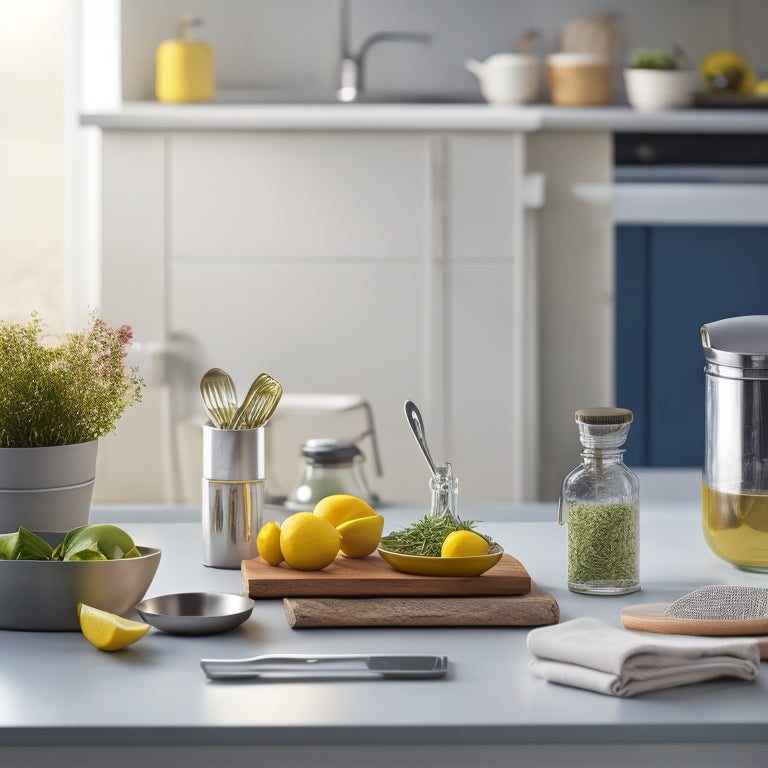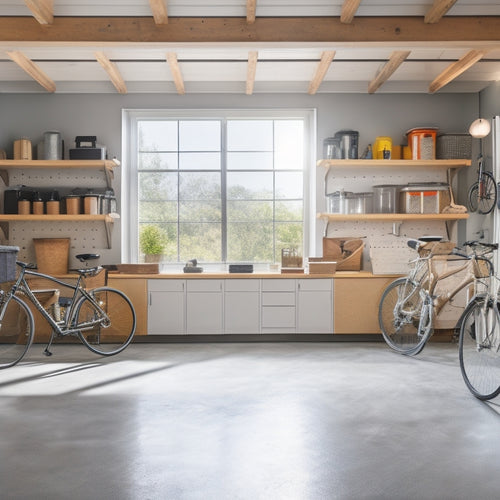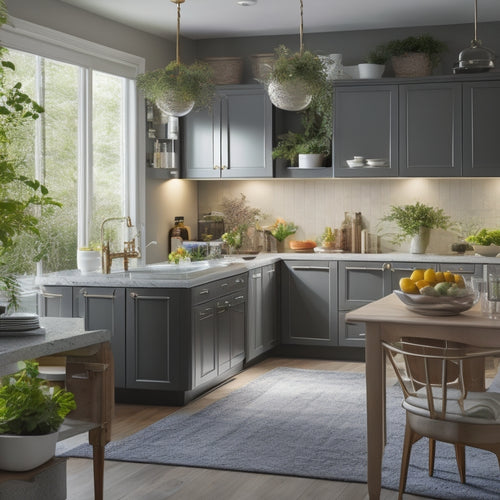
Organize Your Kitchen Counters in 7 Steps
Share
You're about to change your cluttered kitchen counters into a functional and aesthetically pleasing space. To get started, purge your counters by sorting items into categories, evaluating frequency of use, and storing seasonal items separately. Next, categorize and group similar items, assigning a home for each item while utilizing vertical storage spaces. Designate a zone for prep work, implement a "landing strip" system, and maintain your organized counters with daily cleaning and seasonal evaluations. By following these 7 steps, you'll be on your way to a more efficient kitchen that sparks joy, and there's more to uncover to make your space truly shine.
Key Takeaways
- Remove all items from counters, categorize, and assess frequency of use to declutter and free up space.
- Assign a home for each item, ensuring easy access to essential tools and appliances while maintaining visual harmony.
- Utilize vertical storage spaces, such as shelves and baskets, to maximize storage and reduce clutter.
- Designate a zone for prep work, storing frequently used cooking tools within arm's reach and near a water source.
- Implement a "landing strip" system to organize daily essentials, like keys and mail, and maintain a clutter-free zone.
Purge and Declutter Your Counters
Every inch of your kitchen counters is prime real estate, and it's time to take back control from the clutter that's been occupying it.
Start by removing everything from your counters and sorting items into categories. Be honest with yourself - do you really use that kitchen tool daily, or is it just taking up space?
Consider storing seasonal items, like holiday-themed dishware, in a separate area to free up counter space. As you declutter, remember to adopt a one in, one out policy to prevent new clutter accumulation.
Take stock of your cleaning supplies and appliance storage - can you consolidate or relocate them to optimize space efficiency?
As you purge and declutter, consider the aesthetic you want to achieve on your countertops, made of materials like granite or marble.
By maintaining organization and regularly revisiting your kitchen space, you'll create a more streamlined and functional kitchen that works for you.
Categorize and Group Similar Items
With your counters cleared of clutter, it's time to categorize and group similar items to create a functional and organized kitchen.
Start by grouping kitchen tools, such as utensils and gadgets, together. Next, categorize countertop appliances, like toasters and blenders, based on their frequency of use.
Consider storage solutions that promote space efficiency, like vertical dividers or turntables, to keep items accessible. Apply organization tips, such as the "zone" concept, to create functional layouts that enhance your kitchen workflow.
As you group and categorize, keep design aesthetics in mind to achieve visual harmony. By implementing these decluttering strategies, you'll be well on your way to a kitchen that's both beautiful and functional.
Assign a Home for Each Item
You'll want to designate specific storage spaces for each item, ensuring everything has a place to live when not in use.
This will help keep your counters clutter-free and make it easier to find what you need when you need it.
Designated Storage Spaces
One key to maintaining a clutter-free kitchen counter is to assign a designated storage space for each item, making it easy to find what you need when you need it. This means selecting the right storage solutions for your kitchen essentials. Consider a container variety that fits your style and needs.
| Item | Storage Solution | Location |
|---|---|---|
| Spices | Stackable spice rack | Near cooking station |
| Oils and Vinegars | Decorative oil dispenser | Near cooking station |
| Coffee and Tea | Canisters or jars | Near coffee maker |
Essential Item Placement
Assigning a home for each item in your kitchen is the next step in maintaining a clutter-free counter.
You'll want to designate a spot for essential tools, cooking gadgets, and countertop appliances, ensuring they're easily accessible and don't clutter your workspace.
Consider the "golden triangle" concept, where frequently used items are placed within easy reach to improve workflow efficiency.
Don't forget to balance functionality with aesthetic appeal by incorporating decorative accents thoughtfully.
Accessibility considerations, such as placing heavy items at waist level, will also enhance your overall kitchen experience.
Utilize Vertical Storage Spaces
You can make the most of your kitchen's vertical storage spaces by maximizing shelf space and optimizing cabinet storage.
This means using stackable containers, baskets, or shelves to store items like cookbooks, infrequently used appliances, and specialty kitchen gadgets.
Maximize Shelf Space
By the time you've decluttered and purged your kitchen counters, you're left with a more manageable amount of items to store.
Now, it's time to maximize your shelf space using effective shelf organization and space saving techniques. Consider container options that fit your shelf height and style, and don't be afraid to get creative with decorative storage solutions.
Multi-functional items, like a utensil organizer with a built-in knife block, can also help streamline your storage. If you have limited shelf space, look into under counter solutions or open shelving to keep frequently used items within easy reach.
Optimize Cabinet Storage
Most kitchen cabinets are a wealth of untapped storage potential, with vast expanses of vertical space waiting to be employed.
You can optimize your cabinet storage by installing shelves, baskets, or hooks to maximize the use of this space. This will help keep frequently used items within easy reach, freeing up counter space for food preparation.
Consider a pegboard or a spice rack on the back of a cabinet door to increase storage capacity. You can also use adjustable shelves or baskets to accommodate items of different sizes.
Designate a Zone for Prep Work
Designating a zone for prep work on your kitchen counter is essential for efficient food preparation. This dedicated space, often referred to as a prep station, should be strategically located near a water source and trash can.
It's where you'll chop, dice, and mince ingredients, so make sure it's easily accessible and well-lit. Store frequently used cooking tools, such as knives, cutting boards, and utensils, within arm's reach to streamline your workflow.
Consider investing in a countertop organizer or tray to corral small items and keep your prep station tidy. By designating a specific zone for prep work, you'll be able to focus on cooking without clutter and chaos getting in the way.
Implement a "Landing Strip" System
As you've optimized your prep station, you're now ready to create a system to manage the influx of items that enter your kitchen daily. A "landing strip" system is the solution, where you designate a specific area on your counter for item organization.
This functional design allocates a specific space for daily routines, such as placing keys, mail, and other essentials, keeping them within easy access. With a minimalist approach, you'll achieve a clutter-free zone that maintains visual appeal.
Maintain Your Organized Counters
You've set up your landing strip system, and now it's vital to maintain the organization you've achieved. Regular cleaning and counter maintenance are necessary to prevent clutter from building up again. Schedule seasonal reassessments to update your design and functional decor as needed.
| Task | Frequency |
|---|---|
| Clean counters | Daily |
| Reassess design and decor | Seasonally |
| Involve family in maintenance | Ongoing |
Adopt a minimalistic approach to storage solutions, and make certain everyone in the household is involved in maintaining the organization. By doing so, you'll create a system that is easy to sustain and enjoy the benefits of a clutter-free kitchen.
Frequently Asked Questions
What if I Have Limited Counter Space for Certain Appliances?
You're steering through a treasure chest of kitchen gadgets, but counter space is the map that's missing. Don't worry, you can chart a new course with counter space solutions like wall-mounted appliances or compact appliance alternatives that'll free up room for your treasures.
How Do I Store Sharp Objects Safely Out of Children's Reach?
You'll guarantee child safety by storing sharp objects like knives in a locked cabinet or high shelf, using knife storage solutions with safety latches, and keeping them out of reach to avoid accidents and injuries.
Can I Use Adhesive Hooks on My Countertop or Cabinets?
You can use adhesive hooks on your countertop or cabinets, but choose the right type to avoid damage; opt for removable adhesive hooks or 3M Command strips to guarantee easy removal without residue or countertop damage.
What Is the Best Material for Countertop Organizers and Accessories?
You'll find that the best material for countertop organizers and accessories depends on your style and needs. Wooden organizers add a warm touch, while acrylic trays provide a sleek, modern look and are easy to clean.
How Often Should I Reorganize My Kitchen Counters to Maintain Order?
Think of Sarah, who reorganized her kitchen counters every 3 months, incorporating seasonal organization strategies, and maintained a clutter-free space. You should aim to reorganize your kitchen counters every 2-3 months, using kitchen decluttering tips, to keep your space organized and functional.
Related Posts
-

Why Garage Storage Matters in Home Decor
As you reimagine your living space, don't underestimate the garage's impact on your home's value, your mental well-be...
-

Why Corner Cabinets Are a Kitchen Essential
You're sitting on a goldmine of untapped storage potential in your kitchen - the often-wasted corner spaces that can ...
-

Boost Productivity With a Home Office Makeover
By altering your home office into a clutter-free, ergonomic, and inspiring space, you'll reveal your full productivit...


